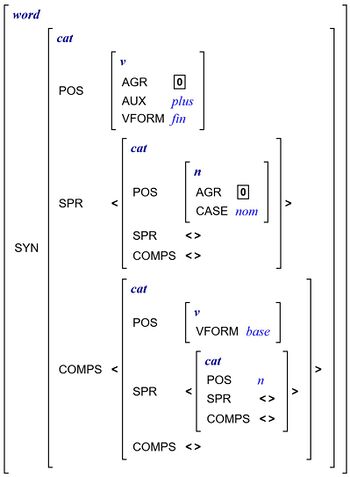Syntax 1 Wiki: Week 6: Difference between revisions
No edit summary |
|||
| Line 2: | Line 2: | ||
<font size="3"> | <font size="3"> | ||
== Raising | == Auxiliaries and Raising == | ||
=== Words selecting for particular other words === | |||
Revision as of 14:18, 29 November 2020
Auxiliaries and Raising
Words selecting for particular other words
Raising
- There is a special verb class called subject raising verbs.
- These verbs are easy to identify by applying the following tests.
- If the verb passes theses tests, then it is a subject raising verbs.
- Usually, if the verb passes one of these tests, then it passes all of them.
Subject raising verb Test Nr. 1
If the verb V takes a non-finite VP-complement headed by the verb rain, then V must take the idiomatic word it as its subject.
Illustration:
(1)
a. Itidiom rained.
b. Itidiom will rain.
(2)
a. * The student rained.
b. * The student will rain.
Subject raising verb Test Nr. 2
If the verb V takes a non-finite VP-complement headed by a verb that selects an idiomatic NP as its subject, then V must take this idiomatic NP as V’s subject.
Illustration:
(1)
a. All hellidiom brokeidiom loose.
b. All hellidiom will breakidiom loose.
(2)
a. * An accidentidiom brokeidiom loose.
b. * An accidentidiom will breakidiom loose.
Subject raising verb Test Nr. 3
If the verb V takes a non-finite VP-complement headed by a verb that imposes semantic requirements on its subject, then V must impose those same semantic requirements on V’s subject. Illustration:
The verb kill only requires of its subject that it express some kind of force that kills the referent of the direct object. That force can be alive or not:
(3)
a. The student willV kill the politician.
b. The accident willV kill the politician.
In contrast, the verb assassinate requires its subject to express a person. Forces cannot assassinate anyone!
(4)
a. The student willV assassinate the politician.
b. * The accident willV assassinate the politician.
The same case can be made with the verbs like (which requires a living being as its subject) or happen (which requires an event as its subject).
Subject raising verb Test Nr. 4
If the verb V takes a non-finite VP-complement headed by a verb that selects a subject of a particular syntactic category, then V must select a subject of the same syntactic category.
Illustration:
The verb like requires its subject to be an NP:
(5)
a. [NP The student] willV like the politician.
b. * [S That the student smokes] willV like the politician.
In contrast, the verb annoy allows its subject to be an NP or an S:
(6)
a. [NP The student] willV annoy the politician.
b. [S That the student smokes] willV annoy the politician.
The student
Navigation:
